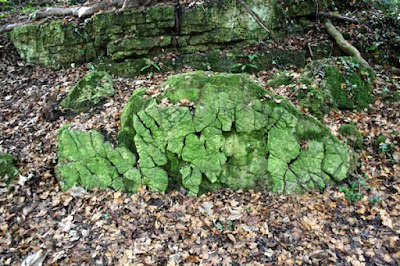 |
| The "Little Stones" at Anston Stones Wood |
Having
previously described several places in West Yorkshire, where I assessed their
value for some new field trip locations for Geotourists, I now return to the
part of England that I know best.
 |
| Differential weathering in the south cliff |
Anston Stones Wood is just one of a handful of RIGS that were
selected as “showcase sites” and is set in one of several gorges that
have been cut through the escarpment of Magnesian Limestone in this part of England.
 |
| The Geological Trail |
Here,
the Permian dolostone of the Cadeby Formation has been cut through by glacial
meltwater flowing from the Pennines to the west – during the Quaternary Period
- leaving cliffs and a valley that is now full of slumped blocks of
rock and loose material, through which Anston Brook meanders. The limestone is further
exposed in railway cuttings, which accommodate the freight
line that still passes along the gorge.
Along
its length, there are exposures of massive, horizontally bedded dolostone, with
small caves and examples of flowstone and, although heavily overgrown and
sometimes not easily accessible, there are also bryozoan reefs. Occasionally,
outcrops of the underlying Mexborough Rock can be seen in the banks of Anston
Brook.
The
Anston Stones Wood Geological Trail, which flew off the shelves wherever it was
stocked, highlights some of the points of interest that can be seen from the
numerous public paths that traverse this biological Site of Special Scientific Interest and, if great care is taken not to disturb the flora and fauna, there
is still a lot more to be seen.
 |
| The Cut |
I have accompanied various local natural history groups to look at the geology,
botany and other wildlife – there are green woodpeckers, but I have not seen
the kingfishers yet - and very many other societies visit this very special
place for their field trips.
 |
| Weathering of a fallen block of stone in The Cut |
Once
you have had a good long walk around Anston Stones Wood, there is another story
to be told in Anston - the quarrying of the stone used to build the Palace of Westminster.
 |
| The Palace of Westminster |